An Oily Tide Washes in With Gulf Storms
When Tropical Storm Lee pummeled the Gulf coast with wind and rain last week, it left more than local floods and wind damage in its wake. Residents from Florida to Louisiana report the slow-moving gale blew in oily residues, thick tar mats and tar balls, confirming fears that the crude from BP’s historic blowout is far from gone.
Charles Taylor of Bay St Louis, MS, said he went out to investigate right after the storm hit to photograph the beach, taking samples of oily crude and tar with a spoon. Taylor said he offered them to the US Coast Guard at a meeting in Biloxi but no one would take them. “I getting fed up with their ways,” he wrote me in an email.
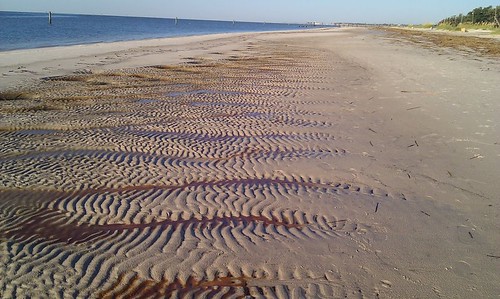
Oil-like substance on Bay St. Louis beach Photo: Charles Taylor
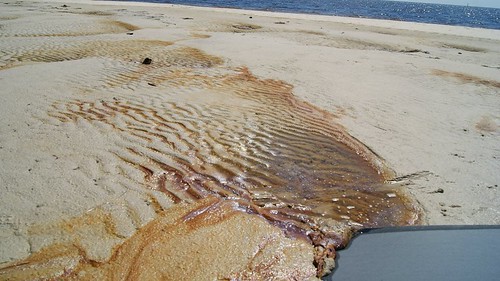
Bay St. Louis beach Photo: Laurie Gayle Lambert
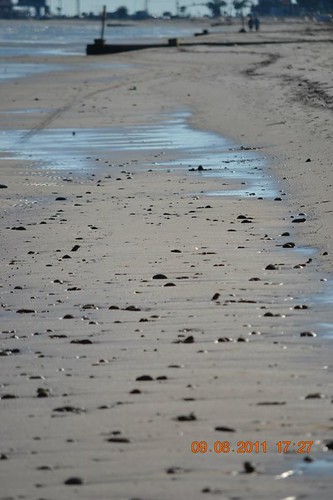
Tar balls on Gulf Shores, MS Photo: Laurel Lockamy
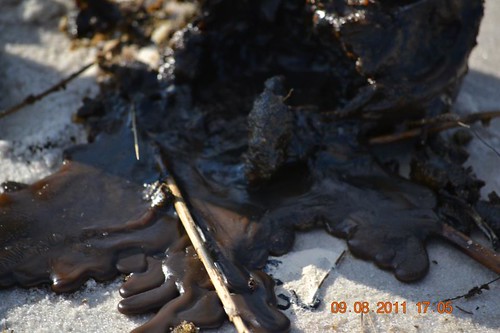
Tar-like substance on Gulf Shore, MS, beach Photo: Laurel Lockamy
To see dramatic video of the aftermath of T.S. Lee, check out this site, Black Oil, Red Blood.
Oil also washed up near hard hit Grand Isle on Fourchon beach. According to the Times-Picayune, the storm surge uncovered tar mats just offshore. The land manager of the Wisner Donation Trust, which owns and takes care of the beach area, wondered when BP was going to really clean up the mess. Here's what she told the paper:
"We've been responding all along to the ongoing contamination we've insisted has been there," she said. "We've done our own science on tar balls and residual oil we've found and turned it over to BP and the contractor down there that's in charge of cleanup."
But instead of increasing cleanup efforts, the work tapered off and became part of what BP and Coast Guard have labeled a program of monitoring and maintenance, she said.
"We have never been out of response mode. We've been out there without a pause, only slowed down a bit during nesting season this spring," Norman said. "We have never stopped seeing oil and they have never cleaned it up."
Gulf municipalities also were concerned about the storms' aftermath. In some areas of Orange Beach, AL, tar balls covered the sand that had been meticulously combed by beach-cleaning machines for months following the oil blowout last year. Although a BP official told WGRG-TV they didn’t find any oil and that the beach was in “really good shape,” others disagreed.
But that's not the case elsewhere in Orange Beach according to Phillip West with the city's Marine Resources division. "Throughout the city it is pretty sporadic and they are typically very small but in a couple of areas we're definitely seeing increased amounts of tar, larger tar balls to the size of cookies."
For that reason the city is asking BP to bring back heavy equipment and take a closer look. "We just think there needs to be a little more surveying done of these areas that are seeing the impacts right now."
It’s not just the beaches many are concerned about along the coast. Some fishermen say they are seeing an unusual number of dead dolphins and that their shrimp catches are dismal this year. Many blame BP’s oil. Commercial crab fisherman Lorrie Williams found a dead dolphin floating off the coast recently. Now she doesn't trust the safety of the crabs she depends on to make a living. Here’s what she posted yesterday on Facebook:
It is time for me to speak out about the Crabs that are not here. The ones that are look as if they have been crawling on a Tar road with black all over the bottoms of them. When ya cook them they stink. When ya eat them after about 3 they leave a nasty taste in your mouth
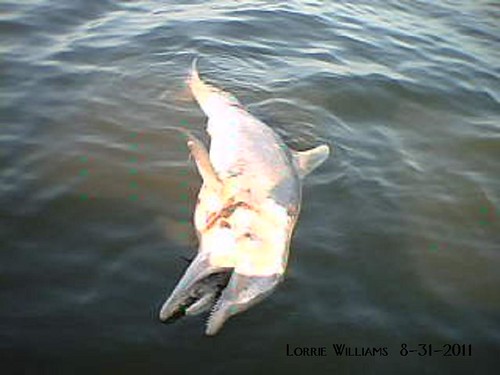
Dead dolphin off MS coast. Photo: Lorrie Williams
Most Gulf residents are used to the often violent storms that roll in during late summer. People have lived here generations, surviving the squalls, the tempests, even the hurricanes Mother Nature blows their way. But for some, these storms are a warning sign that an invisible danger lurks off their shore, an oily threat that some believe is slowly damaging the life forces of the Gulf. And no one knows what the final toll will be.
Much of the rest of the country may think the oil disaster is over. But there are signals that things aren't right in the Gulf. Many along the coast watch and wonder, waiting to see what the next storm blows in.
